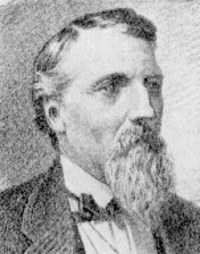Hecker, Friedrich
 A Heidelberg University-educated lawyer, Friedrich Hecker became involved early in republican politics in the German State of Baden, which was to be a hotbed of unrest as political turmoil erupted across Europe in the late 1840’s. One of the sparks which ignited the 1848-49 revolt in Germany was a speech Hecker delivered in the city of Konstanz, April 12, 1848, in which he declared the State of Baden to be a republic. His fame reached such a level in Germany that the official song of the revolutionary forces was known as “the heckerlied.” Military reverses followed, and Hecker and many others were forced to leave Baden for America. His arrival in New York, in October, 1848, saw a reception by a public throng purportedly surpassed to that point only by LaFayette’s visit to America in the 1820’s.
A Heidelberg University-educated lawyer, Friedrich Hecker became involved early in republican politics in the German State of Baden, which was to be a hotbed of unrest as political turmoil erupted across Europe in the late 1840’s. One of the sparks which ignited the 1848-49 revolt in Germany was a speech Hecker delivered in the city of Konstanz, April 12, 1848, in which he declared the State of Baden to be a republic. His fame reached such a level in Germany that the official song of the revolutionary forces was known as “the heckerlied.” Military reverses followed, and Hecker and many others were forced to leave Baden for America. His arrival in New York, in October, 1848, saw a reception by a public throng purportedly surpassed to that point only by LaFayette’s visit to America in the 1820’s.
Hecker and many compatriots settled in southern Illinois, in the area of Belleville just east of St. Louis, where they were known as the “Latin Farmers.” Hecker was among the first prominent citizens of Illinois to embrace the new Republican Party in the 1850’s. As war approached in 1861, Hecker is said to have rowed across the Mississippi to St. Louis, where he enrolled as a private in one of the German military units organized by Frank Blair and Nathaniel Lyon to defend the St. Louis Arsenal, the 3rd Missouri Volunteer Infantry which was commanded by his Baden friend Franz Sigel. Hecker was present at the Camp Jackson affair on May 10, 1861.
When the 3rd Missouri’s enlistments expired, Hecker was appointed colonel of the 24th Illinois, and operated for a time in southeast Missouri in conjunction with U.S. Grant’s 21st Illinois, and then became colonel of the 81st Illinois. This was the so-called “Hecker Regiment,” a German and Jewish regiment organized in Chicago. After suffering a wound in the Battle of Chancellorsville, and a disagreement with his superiors, Hecker resigned his commission and returned to his farm near Belleville late in 1863.
Friedrich Hecker died in 1881, and is buried in the city cemetery in Summerfield, Illinois, just outside the St. Louis suburb of Lebanon.

